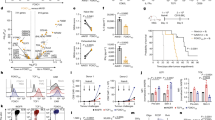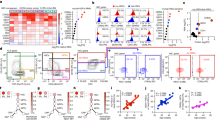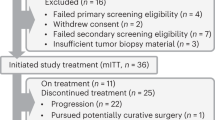Abstract
The role of B cells in T-cell priming is unclear, and the effects of B-cell depletion on immune responses to cancer vaccines are unknown. Although results from some mouse models suggest that B cells may inhibit induction of T cell–dependent immunity by competing with antigen-presenting cells for antigens, skewing T helper response toward a T helper 2 profile and/or inducing T-cell tolerance1,2,3,4, results from others suggest that B cells are necessary for priming as well as generation of T-cell memory5,6,7. We assessed immune responses to a well-characterized idiotype vaccine in individuals with severe B-cell depletion but normal T cells after CD20-specific antibody–based chemotherapy of mantle cell lymphoma in first remission. Humoral antigen- and tumor-specific responses were detectable but delayed, and they correlated with peripheral blood B-cell recovery. In contrast, vigorous CD4+ and CD8+ antitumor type I T-cell cytokine responses were induced in most individuals in the absence of circulating B cells. Analysis of relapsing tumors showed no mutations or change in expression of target antigen to explain escape from therapy. These results show that severe B-cell depletion does not impair T-cell priming in humans. Based on these results, it is justifiable to administer vaccines in the setting of B-cell depletion; however, vaccine boosts after B-cell recovery may be necessary for optimal humoral responses.
This is a preview of subscription content, access via your institution
Access options
Subscribe to this journal
Receive 12 print issues and online access
$209.00 per year
only $17.42 per issue
Buy this article
- Purchase on Springer Link
- Instant access to full article PDF
Prices may be subject to local taxes which are calculated during checkout



Similar content being viewed by others
References
Qin, Z. et al. B cells inhibit induction of T-cell-dependent tumor immunity. Nat. Med. 4, 627–630 (1998).
Gajewski, T.F., Pinnas, M., Wong, T. & Fitch, F.W. Murine Th1 and Th2 clones proliferate optimally in response to distinct antigen-presenting cell populations. J. Immunol. 146, 1750–1758 (1991).
Eynon, E.E. & Parker, D.C. Small B cells as antigen-presenting cells in the induction of tolerance to soluble protein antigens. J. Exp. Med. 175, 131–138 (1992).
Bennett, S.R., Carbone, F.R., Toy, T., Miller, J.F. & Heath, W.R. B cells directly tolerize CD8(+) T cells. J. Exp. Med. 188, 1977–1983 (1998).
Yang, X. & Brunham, R.C. Gene knockout B-cell-deficient mice demonstrate that B cells play an important role in the initiation of T-cell responses to Chlamydia trachomatis (mouse pneumonitis) lung infection. J. Immunol. 161, 1439–1446 (1998).
Linton, P.J., Harbertson, J. & Bradley, L.M. A critical role for B-cells in the development of memory CD4 cells. J. Immunol. 165, 5558–5565 (2000).
Shen, H. et al. A specific role for B cells in the generation of CD8 T-cell memory by recombinant Listeria monocytogenes . J. Immunol. 170, 1443–1451 (2003).
Kwak, L.W. et al. Induction of immune responses in patients with B-cell lymphoma against the surface immunoglobulin idiotype expressed by their tumors. N. Engl. J. Med. 327, 1209–1215 (1992).
Bendandi, M. et al. Complete molecular remission induced by patient-specific vaccination plus granulocyte-monocyte colony-stimulating factor against lymphoma. Nat. Med. 5, 1171–1177 (1999).
Timmerman, J.M. et al. Idiotype-pulsed dendritic cell vaccination for B-cell lymphoma: clinical and immune responses in 35 patients. Blood 99, 1517–1526 (2002).
Kwak, L.W., Young, H.A., Pennington, R.W. & Weeks, S.D. Vaccination with syngeneic, lymphoma-derived immunoglobulin idiotype combined with granulocyte/macrophage colony-stimulating factor primes mice for a protective T-cell response. Proc. Natl. Acad. Sci. USA 93, 10972–10977 (1996).
Wilson, W.H. et al. The role of rituximab and chemotherapy in aggressive B-cell lymphoma: a preliminary report of dose-adjusted EPOCH-R. Semin. Oncol. 29, 41–47 (2002).
Little, R.F. et al. Highly effective treatment of acquired immunodeficiency syndrome-related lymphoma with dose-adjusted EPOCH: impact of antiretroviral therapy suspension and tumor biology. Blood 101, 4653–4659 (2003).
Malyguine, A. et al. A modified human ELISPOT assay to detect specific responses to primary tumor cell targets. J. Transl. Med. 2, 9 (2004).
Schroder, C. et al. Anti-CD20 treatment depletes B-cells in blood and lymphatic tissue of cynomolgus monkeys. Transpl. Immunol. 12, 19–28 (2003).
Kneitz, C., Wilhelm, M. & Tony, H.P. Effective B-cell depletion with rituximab in the treatment of autoimmune diseases. Immunobiology 206, 519–527 (2002).
Paroli, M. et al. Long-lasting memory-resting and memory-effector CD4+ T-cells in human X-linked agammaglobulinemia. Blood 99, 2131–2137 (2002).
Kobrin, C., Bendandi, M. & Kwak, L. Novel secondary Ig VH gene rearrangement and in-frame Ig heavy chain complementarity-determining region III insertion/deletion variants in de novo follicular lymphoma. J. Immunol. 166, 2235–2243 (2001).
Khong, H.T. & Restifo, N.P. Natural selection of tumor variants in the generation of “tumor escape” phenotypes. Nat. Immunol. 3, 999–1005 (2002).
Rosenberg, S.A. Development of effective immunotherapy for the treatment of patients with cancer. J. Am. Coll. Surg. 198, 685–696 (2004).
Vigouroux, S., Yvon, E., Biagi, E. & Brenner, M.K. Antigen-induced regulatory T cells. Blood 104, 26–33 (2004).
Hennessy, B.T., Hanrahan, E.O. & Daly, P.A. Non-Hodgkin lymphoma: an update. Lancet Oncol. 5, 341–353 (2004).
Cheson, B.D. et al. Report of an international workshop to standardize response criteria for non-Hodgkin's lymphomas. NCI Sponsored International Working Group. J. Clin. Oncol. 17, 1244 (1999). (Erratum in J. Clin. Oncol. 18, 2351 (1999).)
Carroll, W.L., Thielemans, K., Dilley, J. & Levy, R. Mouse x human heterohybridomas as fusion partners with human B-cell tumors. J. Immunol. Methods 89, 61–72 (1986).
Neelapu, S.S. et al. Human autologous tumor-specific T-cell responses induced by liposomal delivery of a lymphoma antigen. Clin. Cancer Res. 10, 8309–8317 (2004).
Schultze, J.L. et al. Follicular lymphomas can be induced to present alloantigen efficiently: a conceptual model to improve their tumor immunogenicity. Proc. Natl. Acad. Sci. USA 92, 8200–8204 (1995).
Andersen, N.S. et al. Soluble CD40 ligand induces selective proliferation of lymphoma cells in primary mantle cell lymphoma cell cultures. Blood 96, 2219–2225 (2000).
Neelapu, S.S., Baskar, S. & Kwak, L.W. Detection of keyhole limpet hemocyanin (KLH)-specific immune responses by intracellular cytokine assay in patients vaccinated with idiotype-KLH vaccine. J. Cancer Res. Clin. Oncol. 127 Suppl. 2, R14–19 (2001).
Mattis, A.E., Bernhardt, G., Lipp, M. & Forster, R. Analyzing cytotoxic T lymphocyte activity: a simple and reliable flow cytometry-based assay. J. Immunol. Methods 204, 135–142 (1997).
Kwak, L.W. et al. Transfer of myeloma idiotype-specific immunity from an actively immunized marrow donor. Lancet 345, 1016–1020 (1995).
Acknowledgements
We thank the physicians, pharmacy and nursing staff of the 13E unit in Building 10, National Institutes of Health Clinical Center, for their patient care. We thank A. Malyguine, S. Strobl and K. Shafer-Weaver for performing the ELISPOT assays and Amgen for providing the sCD40Lt. We also thank the patients for participating in this trial. We thank A. Woo for editorial assistance and J. Horton and M. Ferraro for help with data management.
Author information
Authors and Affiliations
Corresponding author
Ethics declarations
Competing interests
Larry W. Kwak is a consultant for Accentia Biopharmaceuticals, which developed the vaccine product used in the study. Although Accentia did not sponsor this study, the company may gain from results presented herein.
Supplementary information
Supplementary Fig. 1
Peripheral blood T-cell dynamics. (PDF 66 kb)
Supplementary Fig. 2
Tumor-specific immune responses in postvaccine PBMCs were associated with both human leukocyte antigen (HLA) class I and class II molecules. (PDF 69 kb)
Supplementary Fig. 3
Postvaccine PBMCs specifically recognized autologous idiotype protein. (PDF 65 kb)
Supplementary Fig. 4
Persistence of target antigen at relapse. (PDF 63 kb)
Rights and permissions
About this article
Cite this article
Neelapu, S., Kwak, L., Kobrin, C. et al. Vaccine-induced tumor-specific immunity despite severe B-cell depletion in mantle cell lymphoma. Nat Med 11, 986–991 (2005). https://doi.org/10.1038/nm1290
Received:
Accepted:
Published:
Issue Date:
DOI: https://doi.org/10.1038/nm1290
This article is cited by
-
Immunotherapy in hematologic malignancies: achievements, challenges and future prospects
Signal Transduction and Targeted Therapy (2023)
-
Cancer vaccines: the next immunotherapy frontier
Nature Cancer (2022)
-
Current trials for frontline therapy of mantle cell lymphoma
Journal of Hematology & Oncology (2018)
-
Phase I study of an active immunotherapy for asymptomatic phase Lymphoplasmacytic lymphoma with DNA vaccines encoding antigen-chemokine fusion: study protocol
BMC Cancer (2018)
-
Paramount therapy for young and fit patients with mantle cell lymphoma: strategies for front-line therapy
Journal of Experimental & Clinical Cancer Research (2018)



